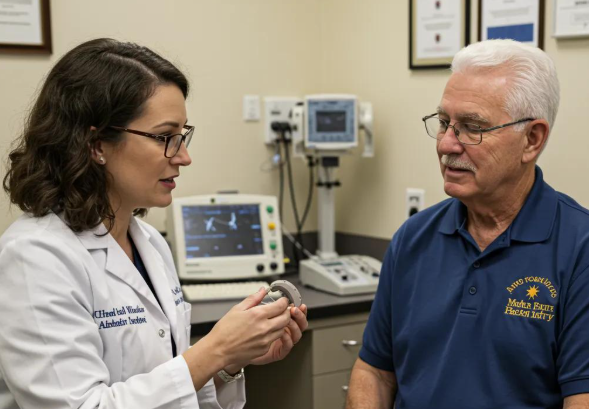Military service can cause service-connected hearing loss when loud or repeated noise exposures damage the inner ear, and many veterans live with hearing difficulty and tinnitus as a result. This article explains why veterans experience these conditions, how the VA evaluates and rates hearing loss and tinnitus, and what practical steps veterans can take to document service connection and access benefits. You will learn common causes of service-related auditory injury, a checklist of evidence for VA claims, available treatment pathways including hearing aids and sound therapy, and how to take action locally with a free diagnostic hearing test.
Veterans and Service-Connected Hearing Loss
Military service often involves high levels of noise exposure that can permanently impact hearing. Many veterans experience hearing loss or tinnitus due to repeated acoustic trauma during training or deployment. This article from Lifetime Hearing Services explains why these conditions are so common, how the VA evaluates and rates hearing loss and tinnitus, and what steps veterans can take to document a service connection and access their benefits.
You’ll learn about the common causes of service-related hearing damage, documentation checklists for VA claims, and treatment options such as hearing aids and sound therapy. The article also highlights how Lifetime Hearing Services supports veterans with free diagnostic hearing tests, hearing aid fittings, and local follow-up care across Florence, Hartsville, and the Pee Dee region.
Why Veterans Experience Service-Connected Hearing Loss
Service-connected hearing loss develops when exposure to loud or repeated noises damages the delicate structures of the inner ear. These injuries—frequent in military environments—can cause sensorineural hearing loss and are often accompanied by tinnitus. Understanding how noise trauma and blast pressure affect the cochlea helps veterans recognize symptoms early and document their condition accurately for both treatment and VA claims.
Common Causes of Military-Related Hearing Loss
Frequent noise from gunfire, aircraft, heavy vehicles, and explosions are leading sources of auditory injury among service members. Repeated exposure to blast pressure may also affect how the brain processes sound, compounding hearing difficulties. Some veterans face additional risk from ototoxic chemicals or medications used during service. Identifying these exposures is key when establishing a service connection through the VA.
Tinnitus and Its Link to Military Noise Exposure
Tinnitus—a ringing, buzzing, or humming sound in the ears—is one of the most common service-connected conditions among veterans. It occurs when the brain amplifies internal sound signals after hearing damage reduces external input. At Lifetime Hearing Services, comprehensive audiologic evaluations include tinnitus screening, counseling, and sound management strategies to reduce its daily impact.
Recognizing the Symptoms
Veterans often notice:
Trouble understanding speech, especially in background noise
Needing higher TV or phone volume
Fatigue after conversations
Persistent ringing or buzzing sounds
These issues can lead to communication struggles, social withdrawal, and emotional stress. Tracking when symptoms began and the types of noise exposures experienced during service helps create a strong case for both treatment and VA eligibility.
Understanding VA Hearing Benefits
VA benefits for hearing-related conditions include disability compensation and audiology services. To qualify, veterans must provide documentation linking their hearing loss or tinnitus to military service. Typical submissions include service records, audiograms, and a clinician’s statement confirming the connection.
VA Benefits Overview:
Disability Compensation: Monthly payments based on hearing loss or tinnitus severity.
VA Audiology Services: Access to testing, hearing aids, and ongoing care.
Tinnitus Service Connection: Separate rating available for tinnitus if proven service-related.
Local clinics such as Lifetime Hearing Services can assist veterans with diagnostic testing and documentation to strengthen their VA claims.
VA Disability Ratings Explained
VA disability ratings depend on the results of a current audiogram and how hearing loss affects daily communication. Ratings for hearing loss and tinnitus are determined separately. Having an up-to-date test from a certified audiologist—like those at Lifetime Hearing Services—ensures a fair evaluation and smoother claim process.
Establishing a Service Connection
To prove service-related hearing loss, veterans must demonstrate:
An in-service noise exposure or event
A current diagnosis
A medical nexus linking the two
Lifetime Hearing Services provides complete diagnostic testing and detailed reports that meet VA documentation standards. Veterans are encouraged to bring any service records or previous audiograms to assist in the evaluation process.
Hearing Aids and VA Coverage
Eligible veterans may receive hearing aids, fittings, and follow-up care through VA benefits at no cost. Device type depends on clinical needs and documented hearing loss. Options may include:
Behind-the-Ear (BTE) models for general amplification
Bluetooth-enabled BTEs for improved clarity and tinnitus masking
Custom In-the-Ear (ITE) designs for comfort and discretion
At Lifetime Hearing Services, veterans can compare VA-covered and private-purchase options to find the right fit for their lifestyle and communication needs.
How Hearing Aids Help Veterans
Modern hearing aids enhance communication, reduce listening fatigue, and can lessen tinnitus by increasing access to everyday sounds. Many models include sound therapy programs that help mask tinnitus in quiet settings. The team at Lifetime Hearing Services provides ongoing adjustments and counseling to ensure the best results and improved quality of life.
Tinnitus Treatment Options
Veterans coping with tinnitus benefit from a combination of therapies such as:
Hearing aids with built-in masking features
Dedicated sound therapy systems for relaxation and sleep
Counseling and cognitive-behavioral therapy (CBT) for stress management
Lifetime Hearing Services tailors each tinnitus care plan to the individual, addressing both the auditory and emotional effects of tinnitus.
Why Early Testing Matters
Early testing helps confirm hearing health, create documentation for future claims, and identify changes over time. Detecting hearing loss early allows for faster treatment, better hearing outcomes, and easier VA benefit navigation.
What to Expect at Lifetime Hearing Services
Your appointment includes:
A review of medical and military noise exposure history
A visual ear exam and comprehensive diagnostic hearing test
A personalized consultation and written report for VA claim use
Bring any military or medical records and notes on your hearing challenges. This helps the audiologists at Lifetime Hearing Services provide accurate documentation, professional guidance, and personalized recommendations for next steps.




